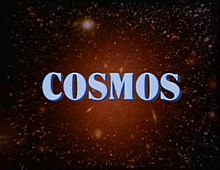
Back الكون: رحلة شخصية Arabic Kosmos: fərdi səyahət (film, 1980) Azerbaijani কসমস: অ্য পারসোনাল ভয়েজ Bengali/Bangla Cosmos: Un viatge personal Catalan Cosmos: Cesta do neznáma Czech Cosmos: A Personal Voyage Danish Unser Kosmos German Cosmos: A Personal Voyage Greek Cosmos: Un viaje personal Spanish Cosmos: A Personal Voyage Basque
| Cosmos: A Personal Voyage | |
|---|---|
 | |
| Genre | Documentary |
| Created by | |
| Directed by | Adrian Malone |
| Presented by | Carl Sagan |
| Composers | Vangelis; various artists |
| Country of origin | United States |
| Original language | English |
| No. of seasons | 1 |
| No. of episodes | 13 (list of episodes) Preview warning: Page using Template:Infobox television with "list_episodes" parameter using self-link. See Infobox instructions and MOS:INFOBOXPURPOSE. |
| Production | |
| Producers |
|
| Running time | 60 minutes |
| Original release | |
| Network | PBS |
| Release | October 1, 1980 – November 1, 1981 |
| Related | |
| |
| Infobox instructions (only shown in preview) | |
Cosmos: A Personal Voyage is a thirteen-part, 1980–81 television series written by Carl Sagan, Ann Druyan, and Steven Soter, with Sagan as presenter. It was executive-produced by Adrian Malone, produced by David Kennard, Geoffrey Haines-Stiles, and Gregory Andorfer, and directed by the producers, David Oyster, Richard Wells, Tom Weidlinger, and others. It covers a wide range of scientific subjects, including the origin of life and a perspective of our place in the universe. Owing to its bestselling companion book and soundtrack album using the title, Cosmos, the series is widely known by this title, with the subtitle omitted from home video packaging. The subtitle began to be used more frequently in the 2010s to differentiate it from the sequel series that followed.
The series was first broadcast by the Public Broadcasting Service in 1980, and was the most widely watched series in the history of American public television until The Civil War (1990). As of 2009, it was still the most widely watched PBS series in the world.[1] It won two Emmys and a Peabody Award, and has since been broadcast in more than 60 countries and seen by over 500 million people.[2][3] A book was also published to accompany the series.
Cosmos: A Personal Voyage has been considered highly significant since its broadcast; David Itzkoff of The New York Times described it as "a watershed moment for science-themed television programming".[4]
- ^ "CosmoLearning Astronomy". CosmoLearning. Retrieved October 8, 2009.
- ^ "StarChild: Dr. Carl Sagan". NASA. Retrieved October 8, 2009.
- ^ "Carl Sagan". EMuseum@Minnesota State University. Archived from the original on May 28, 2010. Retrieved October 8, 2009.
- ^ Itzkoff, Dave (August 5, 2011). "'Family Guy' Creator Part of 'Cosmos' Update". The New York Times. Retrieved June 28, 2012.